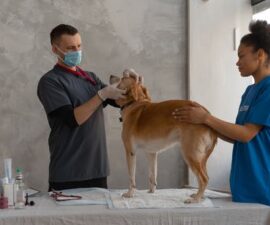Bringing a new pet into your home is a big decision that should not be taken lightly. Proper preparation and research can ensure that you find the perfect furry companion for your family, and a significant part of that process involves selecting a responsible breeder.
In this article, we’ll guide you through the top questions to ask a pet breeding consultant, helping you make an informed decision about which breeder best meets your needs.
The Breeder’s Experience
How Long They’ve Been Breeding
It’s essential to inquire about a breeder’s experience. Longevity in the industry reflects a commitment to ethical breeding practices. Experienced breeders will have valuable insights into the breed’s unique characteristics, predicted temperaments, and potential health concerns.
Some breeders offer pet breeding consultation on their website, which provides essential insights into their breeding programs and practices.
Their Level of Knowledge About the Specific Breed
An in-depth understanding of the breed is paramount, especially when it comes to potential health issues and temperament traits. A knowledgeable breeder will discuss the breed’s strengths and weaknesses and any possible concerns for your future furry friend.
Engagement With Breed Clubs, Organizations, and Canine Sports
Involvement with breed clubs, organizations, or canine sports can indicate a passion for and dedication to their chosen breed. Active participation can also provide the breeder valuable networking and access to current information, ultimately benefiting your new pet.
Health Testing and Screening
The Parents’ Health Tests
Ask about health tests performed on the puppy’s parents and any breed-specific screenings. This information is essential to gauge the likelihood of potential genetic issues and diseases and will provide you with vital knowledge regarding the potential health of your new puppy.
Farm animal veterinary care should be sought for a range of animals, especially when dealing with large animals such as horses and cows. Knowledgeable farm vets can provide essential information on maintaining your animals’ overall health and well-being.
Recognizing Potential Genetic Diseases in the Breed
Genetic diseases can have significant impacts on an animal’s life, and it’s crucial to understand breed-specific health concerns. A responsible breeder will have an awareness of these issues and readily discuss their experience and plans for addressing them.
Socialization and Environment
Puppy Socialization Process
A well-adjusted pet starts with confidence in their surroundings and interactions. Breeders should be able to describe how they introduce new experiences and social interactions to their puppies. Inquire about the environments in which the puppies are raised and how they have been exposed to different situations, animals, and people.
Assessing the Breeder’s Facility and Living Conditions for Puppies
It’s essential to visit a breeder’s facility and observe the puppies’ living conditions. A clean, safe, and nurturing environment supports healthy development and social interactions.
Meeting the Parents: Size, Temperament, and Appearance
Request to meet your potential puppy’s parents to gain insight into their size, appearance, and temperament. This information can help you anticipate the characteristics of your future companion and evaluate the breeder’s commitment to the breed’s standards.
Vaccinations and Medical Care
Ensuring Puppies Are Up-To-Date on Vaccinations
Healthcare starts at a young age, and vaccinations play a crucial role. Ask the breeder about vaccination schedules, and ensure they have appropriately documented records.
Breeder’s Veterinarian Consultations and Records
It’s essential to confirm that the breeder has regularly consulted a veterinarian for their animals’ care. Acquiring a copy of the veterinarian records for your puppy will provide essential information for future medical appointments.
Many veterinary clinics now offer vet laser therapy, which can be beneficial for various ailments. Cold laser treatment for dogs is a non-invasive method for addressing arthritis, muscle injuries, and wound healing.
Health Guarantee and Contract
Understanding the Breeder’s Health Guarantee
Ask the breeder about any health guarantees or warranties provided with the puppy. This information will help you understand your options if your new pet encounters any medical concerns.
The Importance of a Contract
A responsible breeder will have a clear contract outlining the terms and conditions of your agreement. Review this document carefully to ensure your understanding and acceptance.
Returning a Puppy and Breeder’s Policy on Re-Homing
Learn about the breeder’s policies on returns and re-homing situations. A responsible breeder will support the welfare of their animals and assist in finding a suitable home if necessary.
Pickup Age and Transition
When to Bring the Puppy Home
Expect to bring your new pet home between eight and twelve weeks of age. This period is essential for positive socialization and development in a young puppy’s life. Inquire about the breeder’s recommendations for pickup age and be prepared to accommodate their timeline.
Preparing for Puppy’s Arrival
Breeders can provide helpful tips on preparing your home for a new furry family member. Understanding your future pet’s breed-specific needs and preferences can ease their transition to their new surroundings.
The Importance of Gradual Transitions and Continuing Socialization
A smooth transition is essential for a puppy’s well-being and adaptability. Discuss your breeder’s practices and recommendations for introducing your new pet to your home and family, as well as strategies for ongoing socialization.
Breeder Support and Resources
Contacting the Breeder After Pickup
A responsible breeder will continue to be a valuable resource and support system for you and your pet. They should provide contact information and encourage communication regarding questions or concerns, both in the immediate future and throughout your pet’s life.
Breeder’s Role as a Mentor and Resource
Utilize your breeder as a wealth of knowledge and guidance in your pet’s life. Their expertise and familiarity with the breed will offer invaluable assistance in ensuring your pet’s health and happiness.
Building a Long-Term Relationship for Your Dog’s Well-being
Develop a lasting relationship with your breeder. This ongoing connection will benefit your pet’s well-being and provide a strong foundation for their future.
Assessing the Breeder’s Requirements
Questions Breeders Should Ask Potential Owners
Be prepared for a breeder to inquire about your lifestyle, living situation, and plans for integrating a new pet into your home. Their willingness to assess potential owners demonstrates a commitment to the welfare of their animals.
Making the Right Choice for Both the Puppy and Owner
A responsible breeder will prioritize the best interests of both the puppy and the potential owner. Remember that mutual agreement and understanding are essential for ensuring the success of this relationship.
Preparing the Home and Family for a New Addition
Consider the breeder’s insights and recommendations when preparing your home and family for a new pet. Your breeder’s knowledge will guide you through the process and help create a nurturing environment for your new furry friend.
Conclusion
Asking the right questions and thoroughly researching potential breeders is crucial in the journey towards responsible pet ownership. A responsible breeder will prioritize the animal’s and owner’s well-being, ensuring a lifelong bond and the best possible start for your furry friend.










